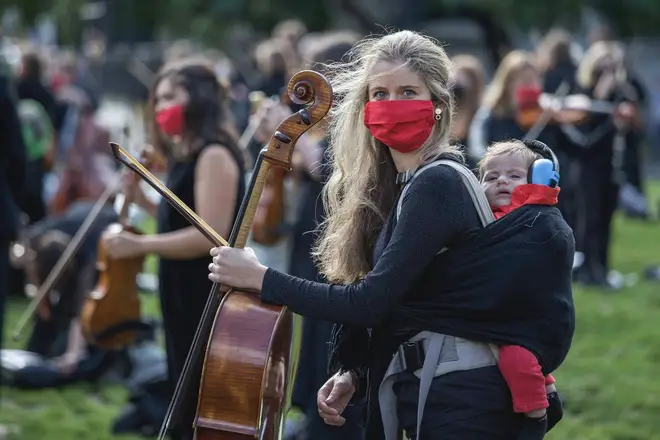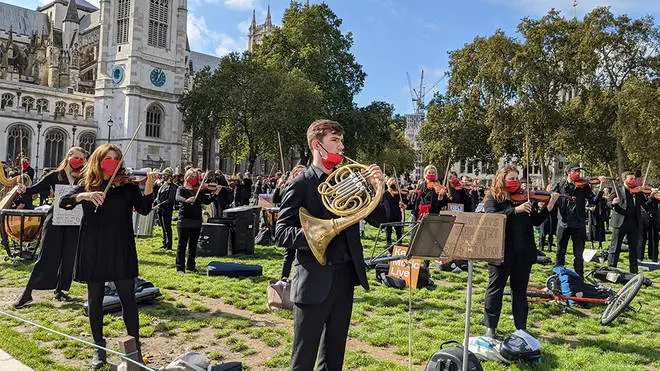On Air Now
Relaxing Evenings with Zeb Soanes 7pm - 10pm
19 October 2021, 11:50 | Updated: 19 October 2021, 15:21

Let Music Live protest on London's Parliament Square
In 2020, thousands of music industry workers were advised to retrain, or get another job, as the total economic output of the industry almost halved due to the pandemic restrictions.
More than a third of jobs in the UK music industry were wiped out in 2020 due to the devastating impact of Covid-19.
This is Music 2021, a new annual report from UK Music, an umbrella organisation representing commercial music in the UK, details how the industry employment level plunged by 35 percent, from 2019’s all-time high of 197,000 to 128,000 in 2020.
“2020 should have been a positive year for the UK music industry,” says UK Music chief executive, Jamie Njoku-Goodwin. “After years of double-digital growth, booming employment and continued international success, we were on course to be the British success story of the decade.
“COVID-19 stopped all that in its tracks. Overnight, the sector was brought to its knees, with live performances banned, international travel restricted, and hundreds of thousands unable to work.”
Read More: Musicians still ‘falling through the gaps’ as £400m announced for struggling arts sector

After years of training and hours of practice, thousands of musicians were heartbreakingly forced to turn to other industries in order to stay afloat during the pandemic.
Last year newspapers told the story of mezzo-soprano Lara Rebekah Harvey, who had been booked to perform at Opera Holland Park in 2020.
With the cancellation of her summer season concerts, the opera singer was forced to look elsewhere for a job, and felt fortunate to secure employment, working in a Lidl store and warehouse, earning about £9 an hour.
TikTok also became a prime example of musicians swapping the stage for stacking shelves, with videos such as TESCO the MUSICAL created by @hannahlowther8, going viral on the platform.
Read More: ‘Musicians are abandoning the performing industry for a stabler career’
The music industry makes a huge contribution to the UK economy; in 2019, this was a record £5.8 billion.
However, as a result of the pandemic, this contribution almost halved, falling by 46 percent to £3.1 billion in 2020.
Britain’s music industry is one of the most successful exporters of music in the world, but UK Music believes it needs the right support in order to return to growth and help power the post-pandemic economic recovery.
Njoku-Goodwin says: “We are determined to look to the future and focus on recovery. In our Music Industry Strategic Recovery Plan we identify the policy interventions required and set out a clear action plan to get the industry back up on its feet.”

UK Music’s Music Industry Strategic Recovery Plan is included in its annual report, and outlines three key principles to ensure that music plays a full role in the post pandemic recovery.
These principals include, securing the next generation of British music success stories through music education and freelancer funding, supporting and protecting events from further pandemic disruptions, and encouraging investment through already successful export schemes, like the Music Export Growth Scheme (MEGS) and International Showcase Fund (ISF).
The report presents this plan ‘as the government prepares for the 2021 Spending Review and transitions into the phase of post-pandemic recovery’.
In the report, culture secretary Nadine Dorries confirms “until now, our focus has been rescue and reopening. Now the priority is to ensure a strong recovery [for the music industry].
“The UK music industry is one of our country’s great national assets, and I give my commitment that the government will continue to back it every step of the way.”

Alongside the music industry’s economic worth, and why it should be supported financially through government investment, Njoku-Goodwin urges that the music industry’s value is about more than just profit-making.
“For the first time, we’ve conducted in-depth polling of the British public to understand the role music plays in all our lives. The results are incredibly revealing,” he says.
“Not only does the British public actively consume more than 60 billion hours of music a year – that’s the equivalent of seven million years, or as long as humans have existed – but music plays a central role in the lives of citizens across the whole country.
“As this report shows, music matters to us all.
“And in a year when we’ve seen just how important music is to all our lives, it’s more important than ever that we take the necessary steps to protect, strengthen and grow the industry.”